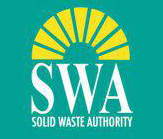The Palm Beach County Commission, sitting as the Solid Waste Authority Governing Board, gave initial approval last week to the SWA’s 2014 budget.
At the June 12 public hearing and workshop, the budget passed with a $1 increase in the single-family tipping rate to enhance the general reserve in the event of storm recovery.
The budget also included significantly reduced collection rates for residents in The Acreage.
The rate for most of the Acreage/Loxahatchee region will drop from $376 per year to $165 per year in eastern portions of The Acreage and $176 per year in western portions of the community, according to SWA Chief Financial Officer Charles Maccarrone.
The savings happened as part of a restructuring that changed the SWA’s collection map from 12 districts to 5. This created greater competition among the bidders, eliminated the wide variations when smaller areas were bid separately and generally stabilized rates across wide areas of the county, according to the SWA budget summary.
Maccarrone explained that the original bidder, Waste Management, assigned its contract to Waste Pro.
“Waste Pro will be the hauler for District 1, which includes the east side of what was District 8, and in District 2, it’s Advanced, which will service the western part of what was District 8, now in District 2,” Maccarrone told the Town-Crier on Monday. “The folks that were in District 8 are saving $211 in one case and $200 in the other.”
The SWA approved franchise awards for solid waste and recycling pickup to five haulers in February. The new bids represented an overall reduction of 23 percent, according to SWA calculations.
The $1 per single-family customer is to cover inflation and increase the reserve, Maccarrone said, explaining that about 60 percent of the SWA’s operating expense is by contracts, which have inflationary factors in them.
If the budget is approved, it would leave a reserve balance of about $63 million, which Maccarrone said is not a lot considering that has been the approximate cost of recovery from recent hurricanes.
“Having a substantial reserve helps us quite a bit in the event of a storm to make sure that we can get moving right away,” he said.
Maccarrone predicted 10 to 15 years of relative stability in the SWA budget.
“The funding is in place to build the system, complete the system,” he said, explaining that the waste-to-energy project is underway and going very well. “I would expect at least over the next 10 years it should be a pretty simple matter.”
During public comment, Acreage resident Patricia Curry asked whether the SWA could enact uniform rates for all districts. “I don’t see why one person’s trash is different than another person’s trash,” Curry said.
SWA attorney Jim Mize said he would not recommend an average or blended rate for service areas. “You are collecting your service fees and collection and disposal fees pursuant to special assessments,” he said. “The special assessment has to reflect the benefit conferred upon the individual property.”
Acreage resident Alex Larson asked why The Acreage had been divided into two parts, and Maccarrone said bids tend to come in higher for the western portion because of road quality and distance between homes.
Commissioner Paulette Burdick asked how the reserve is determined, and Executive Director Mark Hammond said the rough determiner of the reserve is 10 percent of the operating budget.
“That would put it at about $25 million, but several years ago the SWA set a policy to pay off debt. The last of the large debts to be paid off is about $38 million, which will come out of the reserves,” Hammond said. “Of that $63 million, we’ve pretty much earmarked almost $40 million of it right now.”
He also pointed out that when the SWA had determined that it would extend the use of the existing 20-year-old waste treatment plant another 20 years, the SWA had to assume responsibility for anticipated parts failures at the plant that the operator was not willing to take.
“When you’re dealing with a facility that in this case was 20 years old, there are some components that it’s difficult to anticipate when some may or may not fail in the next 20-year period,” he said. “It was almost like self-insurance.”
The total 2014 proposed budget is $253.2 million, down from the original 2013 approved budget of $258.1 million.
Commissioner Shelley Vana made a motion to approve preliminary reading of the budget, which carried 6-0 with Commissioner Jess Santamaria absent.








